Napoleon Contents Birth and education | Early military career | Ruler of France | Emperor of France | Exile in Elba | The Hundred Days | Second exile and death | Legacy | Quotes | Sources | Navigation menuwww.napoleon.org"Cathedral—Ajaccio"Waterloo Voices -1815Napoleon and Persia9123757The First Total War"Execution of the Defenders of Madrid, 3rd May 1808"253080866"Napoleon's height""Death Mask of Napoleon"Size Matters"The Claremont Institute: The Little Tyrant, A review of Napoleon: A Penguin Life"Empires of the Sand: The Struggle for Mastery in the Middle East, 1789–192367554055"Channelling the Emperor: what really killed Napoleon?""The history of measurement"
1769 births1821 deathsDeaths from stomach cancerEmperors and empressesFormer dictatorsFrench deistsFrench generalsFrench politiciansHouse of BonapartePeople from CorsicaPeople with foods named after themPrinces of Andorra
CorsicanobleFranceFirst French RepublicConsulFrench EmpireNapoleonic Warsgreat powercontinental Europealliancesclient statesFrench invasion of RussiaLeipzigElbaBattle of WaterlooSaint Helenastomach cancerpoisonedtyrantNapoleonic codedeistCasa BuonaparteAjaccioRepublic of GenoaunclenobilityLouis XVIsiblingsLucienElisaLouisPaulineCarolineJérômeCatholicAjaccio CathedralBrienneartilleryMarseilleFrench RevolutionFrench Revolutionary WarsroyalistsToulonbrigadier generalThomas CarlyleItalyAustrianSardinianSavoyLombardyMantuaEgyptBritish IndiaFrench DirectoryBattle of PyramidsMamluksbubonic plagueBattle of the NileRosetta StoneJean-François ChampollionBrumairecoup d'étatEmmanuel Joseph SieyèsLucien BonaparteRoger DucosJoseph FouchéCharles Maurice TalleyrandTuileriesMarengoRhine RiverRoman Catholic ChurchFrench RevolutionNapoleonic CodedynastymonarchRoman EmpirePope Pius VIIcoronationNotre Dame CathedralParisLombardyprosperityfinanceeconomycanalsrevolutionCatholicsémigréPeasantsrevolutionrepublicansEnlightenmentvirtueFrench RevolutionBattle of AusterlitzJenaJoseph BonaparteNaplesSicilyLouisConfederation of the RhineFrancis I of AustriaheirBonaparte DynastyNapoleon IIRomeAlexander RomanovPrussiaWestphaliaJeromeRussiaFrench invasion of RussiaBattle of the NationsSwedenRussiaAustriaPrussiaabdicatesuicideAlliesAtlantic OceanLouis XVIIIBattle of WaterlooDuke of WellingtonSaint HelenaAtlantic OceanSaint HelenaAfricaHollandNapoleonic CodeLouis-Napoléonrevolution
Napoleon
Jump to navigation
Jump to search
| Napoleon I | |||||
|---|---|---|---|---|---|
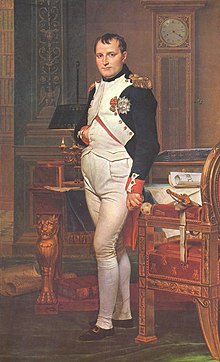 Emperor Napoleon in his study at the Tuileries, by Jacques-Louis David, 1812 | |||||
| Emperor of the French | |||||
| Reign | 18 May 1804 – 11 April 1814 20 March 1815 – 22 June 1815 | ||||
| Coronation | 2 December 1804 | ||||
| Predecessor | French Consulate Himself as First Consul of the French First Republic. Previous ruling monarch was Louis XVI as King of the French (1791–1792) | ||||
| Successor | Louis XVIII (de jure in 1814; as legitimate monarch in 1815) Napoleon II (according to his father's will of 1815) | ||||
| King of Italy | |||||
| Reign | 17 March 1805 – 11 April 1814 | ||||
| Coronation | 26 May 1805 | ||||
| Predecessor | Himself as President of the Italian Republic Previous ruling monarch was Emperor Charles V, crowned in Bologna in 1530 | ||||
| Successor | Kingdom disbanded Next monarch crowned in Milan was Emperor Ferdinand I, next king of Italy was Victor Emmanuel II of Savoy | ||||
| Born | (1769-08-15)15 August 1769 Ajaccio, Corsica | ||||
| Died | 5 May 1821(1821-05-05) (aged 51) Longwood, Saint Helena, British Empire | ||||
| Burial | Les Invalides, Paris | ||||
| Spouse | Joséphine de Beauharnais Marie Louise of Austria | ||||
| Issue | Napoleon II of France | ||||
| |||||
| House | House of Bonaparte | ||||
| Father | Carlo Buonaparte | ||||
| Mother | Letizia Ramolino | ||||
Napoleon Bonaparte[1] was the Emperor of the French and also the King of Italy as Napoleon I. His actions shaped European politics in the early 19th century.
Bonaparte was born in Corsica. His parents were of noble Italian birth. He trained as an officer in mainland France. Napoleon became important under the First French Republic. He led successful campaigns against Coalitions of enemies of the Revolution. In 1799, he staged a coup d'état to make himself First Consul. Five years later the French Senate declared him Emperor. In the first ten years of the nineteenth century, the French Empire under Napoleon waged the Napoleonic Wars. Every European great power joined in these wars. After a number of victories, France became very important in continental Europe. Napoleon increased his power by making many alliances. He also made his friends and family members rule other European countries as French client states.
The French invasion of Russia in 1812 became Napoleon's first big defeat. His army was badly damaged and never fully recovered. In 1813, another Coalition defeated his forces at Leipzig. The year after that, they attacked France. The Coalition exiled Napoleon to the island of Elba. Less than a year later, he escaped Elba and briefly became powerful again. However, he was defeated at the Battle of Waterloo in June 1815. Napoleon spent the last six years of his life confined by the British on the island of Saint Helena. A doctor said he died of stomach cancer but some scientists think he was poisoned.
Napoleon's campaigns are studied at military schools all over the world. He is remembered as a tyrant by his enemies. However, he is also remembered for creating the Napoleonic code.
Although raised a Catholic, Napoleon was a deist.[2]
Contents
1 Birth and education
2 Early military career
2.1 13 Vendémiaire
2.2 Italian Campaign
2.3 Egyptian Campaign
3 Ruler of France
4 Emperor of France
4.1 Reforms
4.2 Napoleonic Code
4.3 The Grand Empire
4.4 Defeat
5 Exile in Elba
6 The Hundred Days
7 Second exile and death
8 Legacy
9 Quotes
10 Sources
10.1 Notes
10.2 Citations
10.3 References
Birth and education |
Napoleon Bonaparte was born in Casa Buonaparte in the town of Ajaccio, Corsica, on the 15th of August 1769. This was one year after the island was given to France by the Republic of Genoa.[3] He was the second of eight children. He was named Napoleone di Buonaparte. He took his first name from an uncle who had been killed fighting the French.[4] However, he later used the more French-sounding Napoléon Bonaparte.[note 1]
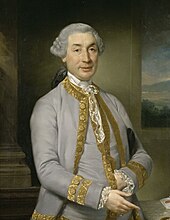
Napoleon's father Carlo Buonaparte was Corsica's representative to the court of Louis XVI of France
The Corsican Buonapartes were from lower Italian nobility. They had come to Corsica in the 16th century.[6] His father Nobile Carlo Buonaparte became Corsica's representative to the court of Louis XVI in 1777. The greatest influence of Napoleon's childhood was his mother, Maria Letizia Ramolino. Her firm education controlled a wild child.[7] He had an older brother, Joseph. He also had younger siblings Lucien, Elisa, Louis, Pauline, Caroline and Jérôme. Napoleon was baptized as a Catholic just before his second birthday, on 21 July 1771 at Ajaccio Cathedral.[8]
Early military career |

2nd Lieutenant Bonaparte
Napoleon was able to enter the military academy at Brienne in 1779. He was nine years old when he entered the academy. He moved to the Parisian École Royale Militaire in 1784 and graduated a year later as a second lieutenant of artillery. Napoleon was able to spend much of the next eight years in Corsica. There he played an active part in political and military matters. He came into conflict with the Corsican nationalist Pasquale Paoli, and his family was forced to flee to Marseille in 1793.
The French Revolution caused much fighting and disorder in France. At times, Napoleon was connected to those in power. Other times, he was in jail. In the French Revolutionary Wars he helped the Republic against royalists who supported the former king of France. In September 1793, he assumed command of an artillery brigade at the siege of Toulon, where royalist leaders had welcomed a British fleet and troops. The British were driven out in December 17, 1793, and Bonaparte was rewarded with promotion to brigadier general and assigned to the French army in Italy in February 1794.
13 Vendémiaire |
General Napoleon Bonaparte was later appointed by the republic to repel the royalists on October 5 1795. More than a 1400 royalists died and the rest fled. He had cleared the streets with "a whiff of grapeshot" according to the 19th-century historian Thomas Carlyle. He was then promoted to major general and marked his name on the French Revolution.
The defeat of the Royalist rebellions ended the threat to the Convention and earned Bonaparte sudden fame, wealth, and the patronage of the new Directory. On March 9, 1796, Napoleon married Josephine de Beauharnais, a widow older than he was and a very unlikely wife to the future ruler.
Italian Campaign |
The campaign in Italy is the first time Napoleon led France to war. Late in March 1796, Bonaparte began a series of operations to divide and defeat the Austrian and Sardinian armies in Italy. He defeated the Sardinians in April 21, bringing Savoy and Nice into France. Then, in a series of brilliant battles, he won Lombardy from the Austrians. Mantua, the last Lombard stronghold fell in February 1797.
Egyptian Campaign |
In May 1798, General Napoleon left for a campaign in Egypt. The French needed to threaten British India and the French Directory was concerned that Napoleon would take control of France. The French Army under Napoleon won an overwhelming victory in the Battle of Pyramids. Barely 300 French soldiers died, while thousands of Mamluks (an old power in the Middle East) were killed. But his army was weakened by bubonic plague and poor supplies because the Navy was defeated at the Battle of the Nile. The Egyptian campaign was a military failure but a cultural success. The Rosetta Stone was found by French engineer Captain Pierre-François Bouchard, and French scholar Jean-François Champollion was able to read the words in the stone. Napoleon went back to France because of a change in the French government. Some believe that Napoleon should not have left his soldiers in Egypt. Napoleon helped lead the Brumaire coup d'état of November 1799.
Ruler of France |

Napoleon during the coup d'état of 18 Brumaire in Saint-Cloud
Bonaparte returned to Paris in October 1799. France's situation had been improved by a series of victories but the Republic was bankrupt, and the ineffective Directory was unpopular with the French population. He was approached by one of the Directors, Emmanuel Joseph Sieyès, for his support in a coup to overthrow the constitutional government. The leaders of the plot included his brother Lucien Bonaparte (the speaker of the Council of Five Hundred), Roger Ducos, another Director, Joseph Fouché, and Charles Maurice Talleyrand. Other deputies realised they faced an attempted coup. Faced with their protests, Bonaparte led troops to seize control and disperse them, which left a rump legislature to name Bonaparte, Sièyes, and Ducos as the three provisional Consuls to administer the government.
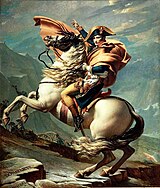
Napoleon Crossing the Alps (1800)
Sieyès expected to dominate the new regime, but he was outmaneuvered by Bonaparte. Napoleon drafted the Constitution of the Year VIII, and secured his own election as First Consul. This made Bonaparte the most powerful person in France, and he took up residence at the Tuileries.
In 1800, Napoleon ensured his power by crossing the Alps and defeating the Austrians at Marengo. He then negotiated a general European peace that established the Rhine River as the eastern border of France. He also concluded an agreement with the pope (the Concordat of 1801), which contributed to French domestic tranquility by ending the quarrel with the Roman Catholic Church that had arisen during the French Revolution.
In France the administration was reorganized, the court system was simplified, and all schools were put under centralized control. French law was standardized in the Napoleonic Code, or civil code, and six other codes. They guaranteed the rights and liberties won in the Revolution, including equality before the law and freedom of religion.
Emperor of France |
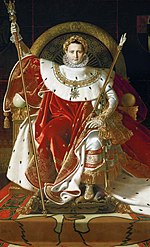
Napoleon on his Imperial throne, by Jean Auguste Dominique Ingres, 1806
In February 1804, a British-financial plot against Bonaparte was uncovered by the former police minister Joseph Fouche. It gave Napoleon a reason to start a hereditary dynasty. On December 2, 1804, Napoleon Bonaparte crowned himself "Emperor of the French". The people of France did not see him as the monarch of the old regime because of his holding a Roman Empire title. He invited Pope Pius VII to see his coronation at Notre Dame Cathedral in Paris. During the ceremony, Napoleon I took the crown from the pope's hand and placed it on his own head. This had been agreed on between Napoleon and the Pope. At Milan Cathedral on May 26 1805, Napoleon was crowned King of Italy with the Iron Crown of Lombardy.
Reforms |
To restore prosperity, Napoleon modernized finance. He regulated the economy to control prices, encouraged new industry, and built roads and canals. To ensure well-trained officials and military officers, he promoted a system of public schools under firm government control. He also repealed some social reforms of the revolution. He made peace with the Catholic Church in the Concordat of 1801. The Concordat kept the Church under state control but recognized religious freedom for Catholics.
Napoleon I won support across class lines. He encouraged the émigré population to return, provided they gave an oath of loyalty. Peasants were relieved when he recognized their right to lands they had bought during the revolution. Napoleon's chief opposition came from royalists and republicans.
Napoleonic Code |
Among Napoleon's most lasting reforms was a new law code, popularly called the Napoleonic Code. It embodied Enlightenment principles such as equality of all citizens before the law, religious toleration, and advancement based on virtue. But the Napoleonic Code undid some reforms of the French Revolution. Women, for example, lost most of their newly gained rights under the new code. the law considered women minors who could not exercise the rights of citizenship. Male heads of households regained full authority over their wives and children. Again, Napoleon valued order and authority over individual rights.
The Grand Empire |

First French Empire at its greatest extent in 1811 French Empire Conquered "Rebellious" States Conquered "Allied" States
Emperor Napoleon abandoned plans to invade England and turned his armies against the Austro-Russian forces, defeating them at the Battle of Austerlitz on December 2, 1805. In 1806 Napoleon destroyed the Prussian army at Jena and Auerstädt and the Russian army at Friedland. He crowned his elder brother Joseph Bonaparte as King of Naples and Sicily in 1806 and converted the Dutch Republic into the kingdom of Holland for his brother Louis. Napoleon also established the Confederation of the Rhine (most of the German states) of which he was protector.
To legitimize his rule, he divorced his wife Joséphine and married Marie Louise, duchess of Parma and daughter of the Emperor Francis I of Austria. Soon she delivered a son and heir to the Bonaparte Dynasty. He was named Napoléon François Joseph Charles Bonaparte or Napoleon II and crowned King of Rome from his birth.
At Tilsit in July 1807, Napoleon made an ally of Russian tsar Alexander Romanov and greatly reduced the size of Prussia. He also added new states to the empire: the kingdom of Westphalia, under his youngest brother Jerome, the duchy of Warsaw, and others states.
Defeat |
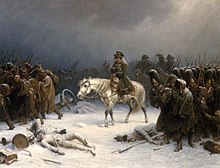
Napoleon's retreat
The Congress of Erfurt sought to preserve the Russo-French alliance and the leaders had a friendly personal relationship after their first meeting at Tilsit in 1807. However, on June 23, 1812, Napoleon went to war with Russia. The French invasion of Russia defeated many Russian cities and villages, but by the time they reached Moscow it was winter. Due to the Russian army's scorched earth tactics, the French found little food for themselves and their horses. Napoleon's army was unable to defeat the Russians. The Russians began to attack. Napoleon and his army had to go back to France. The French suffered greatly in during Napoleon's retreat. Most of his soldiers never returned to France. His army was reduced to 70,000 soldiers and 40,000 stragglers, against more than three times as many Allied troops. Finally at the 1813 Battle of the Nations he was defeated by the Allies: Sweden, Russia, Austria, and Prussia.

Abdication of Emperor Napoleon in Fontainebleau
Exile in Elba |
Napoleon had no choice but to abdicate in favor of his son. However, the Allies refused to accept this. Napoleon abdicated without conditions on April 11, 1814. Before his official abdication, Napoleon attempted suicide with a pill but it did not work.[9] In the Treaty of Fontainebleau the victors exiled him to Elba, an island of 12,000 inhabitants in the Mediterranean. The Allies allowed Napoleon to keep an imperial title "Emperor of Elba" and an allowance of 2 million francs a year. Napoleon even requested a 21 gun salute as emperor of the island of Elba. Many delegates feared that Elba was too close to Europe to keep such a dangerous force.
The Hundred Days |

Battle of Waterloo
Separated from his son and wife, who had come under Austrian control, cut off from the allowance guaranteed to him by the Treaty of Fontainebleau, and aware of rumours he was about to be banished to a remote island in the Atlantic Ocean, Napoleon escaped from Elba on February 26 1815. He made a surprise march on March 1, 1815 to Paris. His former troops joined him and Louis XVIII fled to exile. He again became ruler of France for a length of 100 days. Napoleon was defeated at the Battle of Waterloo by the British under Duke of Wellington and Prussians on June 18 1815, which was his last battle. Napoleon was again captured and taken to his second exile on the island of Saint Helena on the Atlantic Ocean.
Second exile and death |

Napoleon's death at St. Helena
Napoleon was sent to the island of Saint Helena, off the coast of Africa. He died on May 5 1821 of stomach cancer. Napoleon kept himself up to date of the events through The Times and hoped for release in the event that Holland became Prime Minister. There were other plots to rescue Napoleon from captivity including one from Texas, where exiled soldiers from the Grande Armée wanted a resurrection of the Napoleonic Empire in America. There was even a plan to rescue him with a primitive submarine. For Lord Byron, Napoleon was the epitome of the Romantic hero, the persecuted, lonely and flawed genius. The news that Napoleon had taken up gardening at Longwood also appealed to more domestic British sensibilities.
Legacy |

Statue in Cherbourg-Octeville unveiled by Napoleon III in 1858. Napoleon I strengthened the town's defences to prevent British naval incursions.
French people remain proud of Napoleon's glory days. The Napoleonic Code reflects the modern French Constitution. Weapons and other kinds of military technology remained largely static through the Revolutionary and Napoleonic eras, but 18th century operational mobility underwent significant change. Napoleon's biggest influence was in the conduct of warfare. His popularity would later help his nephew Louis-Napoléon to become ruler of France
On the world stage, Napoleon's conquest spread the ideas of the revolution. He failed to make Europe into a French Empire. Instead, he sparked nationalist feeling across Europe.
Quotes |
- “The surest way to remain poor is to be honest“
- “Ability is of little account without opportunity.”
- “I can no longer obey; I have tasted command, and I cannot give it up.”
- “Women are nothing but machines for producing children.”
- “If you wish to be a success in the world, promise everything, deliver nothing.”
- “In politics... never retreat, never retract... never admit a mistake.”
- “He who fears being conquered is sure of defeat.”
- “Soldiers generally win battles; generals get credit for them.”
- “The best cure for the body is a quiet mind.”
- “What is history but a fable agreed upon?”
- "Kiss the feet of Popes provided their hands are tied."
- "Never interrupt your enemy when he is making a mistake"
Sources |
| Wikimedia Commons has media related to Napoleon. |
Notes |
↑ He was called Nabolione in Corsican.[5]
Citations |
↑ McLynn, Frank (1998). Napoleon. Pimlico. p. 6. ISBN 0712662472..mw-parser-output cite.citationfont-style:inherit.mw-parser-output .citation qquotes:"""""""'""'".mw-parser-output .citation .cs1-lock-free abackground:url("//upload.wikimedia.org/wikipedia/commons/thumb/6/65/Lock-green.svg/9px-Lock-green.svg.png")no-repeat;background-position:right .1em center.mw-parser-output .citation .cs1-lock-limited a,.mw-parser-output .citation .cs1-lock-registration abackground:url("//upload.wikimedia.org/wikipedia/commons/thumb/d/d6/Lock-gray-alt-2.svg/9px-Lock-gray-alt-2.svg.png")no-repeat;background-position:right .1em center.mw-parser-output .citation .cs1-lock-subscription abackground:url("//upload.wikimedia.org/wikipedia/commons/thumb/a/aa/Lock-red-alt-2.svg/9px-Lock-red-alt-2.svg.png")no-repeat;background-position:right .1em center.mw-parser-output .cs1-subscription,.mw-parser-output .cs1-registrationcolor:#555.mw-parser-output .cs1-subscription span,.mw-parser-output .cs1-registration spanborder-bottom:1px dotted;cursor:help.mw-parser-output .cs1-ws-icon abackground:url("//upload.wikimedia.org/wikipedia/commons/thumb/4/4c/Wikisource-logo.svg/12px-Wikisource-logo.svg.png")no-repeat;background-position:right .1em center.mw-parser-output code.cs1-codecolor:inherit;background:inherit;border:inherit;padding:inherit.mw-parser-output .cs1-hidden-errordisplay:none;font-size:100%.mw-parser-output .cs1-visible-errorfont-size:100%.mw-parser-output .cs1-maintdisplay:none;color:#33aa33;margin-left:0.3em.mw-parser-output .cs1-subscription,.mw-parser-output .cs1-registration,.mw-parser-output .cs1-formatfont-size:95%.mw-parser-output .cs1-kern-left,.mw-parser-output .cs1-kern-wl-leftpadding-left:0.2em.mw-parser-output .cs1-kern-right,.mw-parser-output .cs1-kern-wl-rightpadding-right:0.2em
↑ www.napoleon.org
↑ McLynn 1998, p.6
↑ Bresler 1999, p.15–16
↑ Asprey 2000, p.4
↑ McLynn 1998, p.2
↑ Cronin 1994, p.20–21
↑ "Cathedral—Ajaccio". La Fondation Napoléon. Retrieved 2008-05-31.
↑ Beardsley, Martyn (2015). Waterloo Voices -1815. Amberley Publishing Limited. pp. vii. ISBN 978-1-4456-1990-3.
References |
Abbott, John (2005). Life of Napoleon Bonaparte. Kessinger Publishing. ISBN 1417970634.
Alder, Ken (2002). The Measure of All Things—The Seven-Year Odyssey and Hidden Error That Transformed the World. Free Press. ISBN 074321675X.
Alter, Peter (2006). Tim Blanning and Hagen Schulze, ed. Unity and Diversity in European Culture c. 1800. Oxford University Press. ISBN 0197263828.
Amini, Iradj (2000). Napoleon and Persia. Taylor & Francis. ISBN 0934211582.
Archer, Christon I.; John R. Ferris and Holger H. Herwig (2002). World History of Warfare. University of Nebraska Press. p. 12. ISBN 0803244231.
Asprey, Robert (2000). The Rise of Napoleon Bonaparte. Basic Books. ISBN 0465048811.
Astarita, Tommaso (2005). Between Salt Water And Holy Water: A History Of Southern Italy. W. W. Norton & Company. ISBN 0393058646.
Balcombe Abell, Lucia Elizabeth (1845). Recollections of the Emperor Napoleon. J. Murray. OCLC 9123757.
Bell, David (2007). The First Total War. Houghton Mifflin Harcourt. ISBN 0618349650.
Bertman, Sandra (2002). "Execution of the Defenders of Madrid, 3rd May 1808". New York University. Retrieved 2008-11-18.
Blaufarb, Rafe (2007). Napoleon: Symbol for an Age, A Brief History with Documents. Bedford. ISBN 0312431104.
Bordes, Philippe (2007). Jacques-Louis David. Yale University Press. ISBN 0300123469.
Bresler, Fenton (1999). Napoleon III: A Life. London: Harper Collins. ISBN 0002557878.
Bruce, Evangeline (1995). Napoleon & Josephine, An Improbable Marriage. Scribners. ISBN 0806522615.
Castle, Ian (1994). Aspern & Wagram 1809: Mighty Clash of Empires. Osprey. ISBN 1855323664.
Chandler, David (1995). The Campaigns of Napoleon. Simon & Schuster. ISBN 0025236601.
Chandler, David (2002). Napoleon. Leo Cooper. ISBN 0850527503.
Cherfils, Christian (1914). Bonaparte et l'Islam d'après les documents français & arabes. Pedone. OCLC 253080866.
Chesney, Charles (2006). Waterloo Lectures:A Study Of The Campaign Of 1815. Kessinger Publishing. ISBN 1428649883.
Connelly, Owen (2006). Blundering to Glory: Napoleon's Military Campaigns. Rowman & Littlefield. ISBN 0742553183.
Cordingly, David (2004). The Billy Ruffian: The Bellerophon and the Downfall of Napoleon. Bloomsbury. ISBN 158234468X.
Cronin, Vincent (1994). Napoleon. HarperCollins. ISBN 0006375219.
Cullen, William (2008). Is Arsenic an Aphrodisiac?. Royal Society of Chemistry. ISBN 0854043632.
Driskel, Paul (1993). As Befits a Legend. Kent State University Press. ISBN 0873384849.
Dunan, Marcel (1963). "Napoleon's height" (in French). La Fondation Napoléon. Retrieved 2009-01-11.
Dwyer, Philip (2008). Napoleon:The Path to Power 1769–1799. Bloomsbury. ISBN 9780747566779.
Edwards, Catharine (1999). Roman Presences. Cambridge University Press. ISBN 052159197X.
Flynn, George Q. (2001). Conscription and democracy: The Draft in France, Great Britain, and the United States. Greenwood Publishing Group. ISBN 031331912X.
Fremont-Barnes, Gregory; Todd Fisher (2004). The Napoleonic Wars: The Rise and Fall of an Empire. Osprey. ISBN 1841768316.
Fulghum, Neil (2007). "Death Mask of Napoleon". University of North Carolina. Retrieved 2008-08-04.
Gates, David (2001). The Spanish Ulcer: A History of the Peninsular War. Da Capo Press. ISBN 0306810832.
Gates, David (2003). The Napoleonic Wars, 1803–1815. Pimlico. ISBN 0712607196.
Geyl, Pieter (1982) [1947]. Napoleon For and Against. Penguin Books. ISBN 0452000572.
Goetz, Robert (2005). 1805: Austerlitz: Napoleon and the Destruction of the Third Coalition. Greenhill Books. ISBN 1853676446.
Hall, Stephen (2006). Size Matters. Houghton Mifflin Harcourt. ISBN 0618470409.
Hanley, Wayne (2005). The Genesis of Napoleonic Propaganda, 1796–1799. Columbia University Press. ISBN 0231124562.
Hanson, Victor Davis (2003). "The Claremont Institute: The Little Tyrant, A review of Napoleon: A Penguin Life". The Claremont Institute. Retrieved 2008-05-30.
Harvey, Robert (2006). The War of Wars. Robinson. ISBN 978-1-84529-635-3.
Hibbert, Christopher (1998). Waterloo: Napoleon's last campaign. Wordsworth Editions. ISBN 1853266876.
Jackson, John (2004). Race, Racism, and Science. ABC-CLIO. ISBN 1851094482.
Johnson, P. (2002). Napoleon: A life. Penguin Books. ISBN 0670030783.
Karsh, Inari (2001). Empires of the Sand: The Struggle for Mastery in the Middle East, 1789–1923. Harvard University Press. ISBN 0674005414.
Kladstrup, Don; Petie Kladstrup (2005). Champagne: How the World's Most Glamorous Wine Triumphed Over War and Hard Times. William Morrow. ISBN 0060737921.
Lowndes, Marie Adelaide Belloc (1943). Where Love And Friendship Dwelt. Macmillan. OCLC 67554055.
Macaulay, Neill (1986). Dom Pedro: The Struggle for Liberty in Brazil and Portugal, 1798–1834. Duke University Press. ISBN 0822306816.
Mari, Francesco; Elisabetta Bertol, Vittorio Fineschi and Steven B Karch (2004-08-01). "Channelling the Emperor: what really killed Napoleon?". Journal of the Royal Society of Medicine (The Royal Society of Medicine Press). http://jrsm.rsmjournals.com/cgi/reprint/97/8/397.pdf. Retrieved 2009-02-15.
Markham, Felix (1988). Napoleon. Mass Market Paperback. ISBN 0451627989.
McLynn, Frank (1998). Napoleon. Pimlico. ISBN 0712662472.
O'Connor, J; E F Robertson (2003). "The history of measurement". St Andrew's University. Retrieved 2008-07-18.
Outhwaite, William (2003). The Blackwell Dictionary of Modern Social Thought. Blackwell. ISBN 0631221646.
Categories:
- 1769 births
- 1821 deaths
- Deaths from stomach cancer
- Emperors and empresses
- Former dictators
- French deists
- French generals
- French politicians
- House of Bonaparte
- People from Corsica
- People with foods named after them
- Princes of Andorra
(window.RLQ=window.RLQ||[]).push(function()mw.config.set("wgPageParseReport":"limitreport":"cputime":"0.688","walltime":"0.857","ppvisitednodes":"value":3743,"limit":1000000,"ppgeneratednodes":"value":0,"limit":1500000,"postexpandincludesize":"value":88779,"limit":2097152,"templateargumentsize":"value":4433,"limit":2097152,"expansiondepth":"value":16,"limit":40,"expensivefunctioncount":"value":1,"limit":500,"unstrip-depth":"value":1,"limit":20,"unstrip-size":"value":102235,"limit":5000000,"entityaccesscount":"value":1,"limit":400,"timingprofile":["100.00% 715.283 1 -total"," 46.04% 329.314 46 Template:Cite_book"," 18.77% 134.229 1 Template:Lang"," 15.88% 113.605 1 Template:Infobox_royalty"," 14.86% 106.303 2 Template:Infobox"," 13.00% 93.018 2 Template:Reflist"," 5.14% 36.741 3 Template:Br_separated_entries"," 4.42% 31.583 6 Template:Cite_web"," 4.01% 28.710 1 Template:Cite_journal"," 3.83% 27.369 1 Template:See_also"],"scribunto":"limitreport-timeusage":"value":"0.437","limit":"10.000","limitreport-memusage":"value":20065449,"limit":52428800,"cachereport":"origin":"mw1254","timestamp":"20190414235551","ttl":86400,"transientcontent":true);mw.config.set("wgBackendResponseTime":574,"wgHostname":"mw1324"););